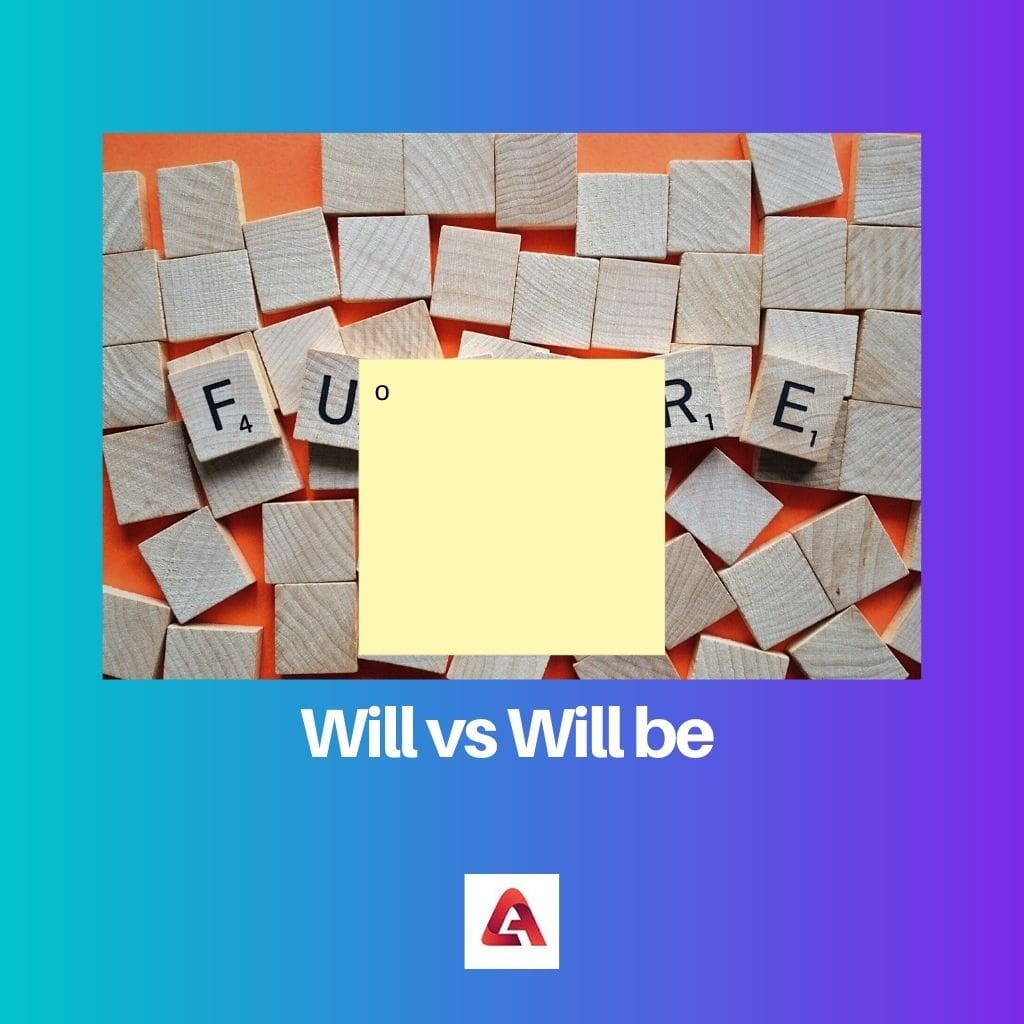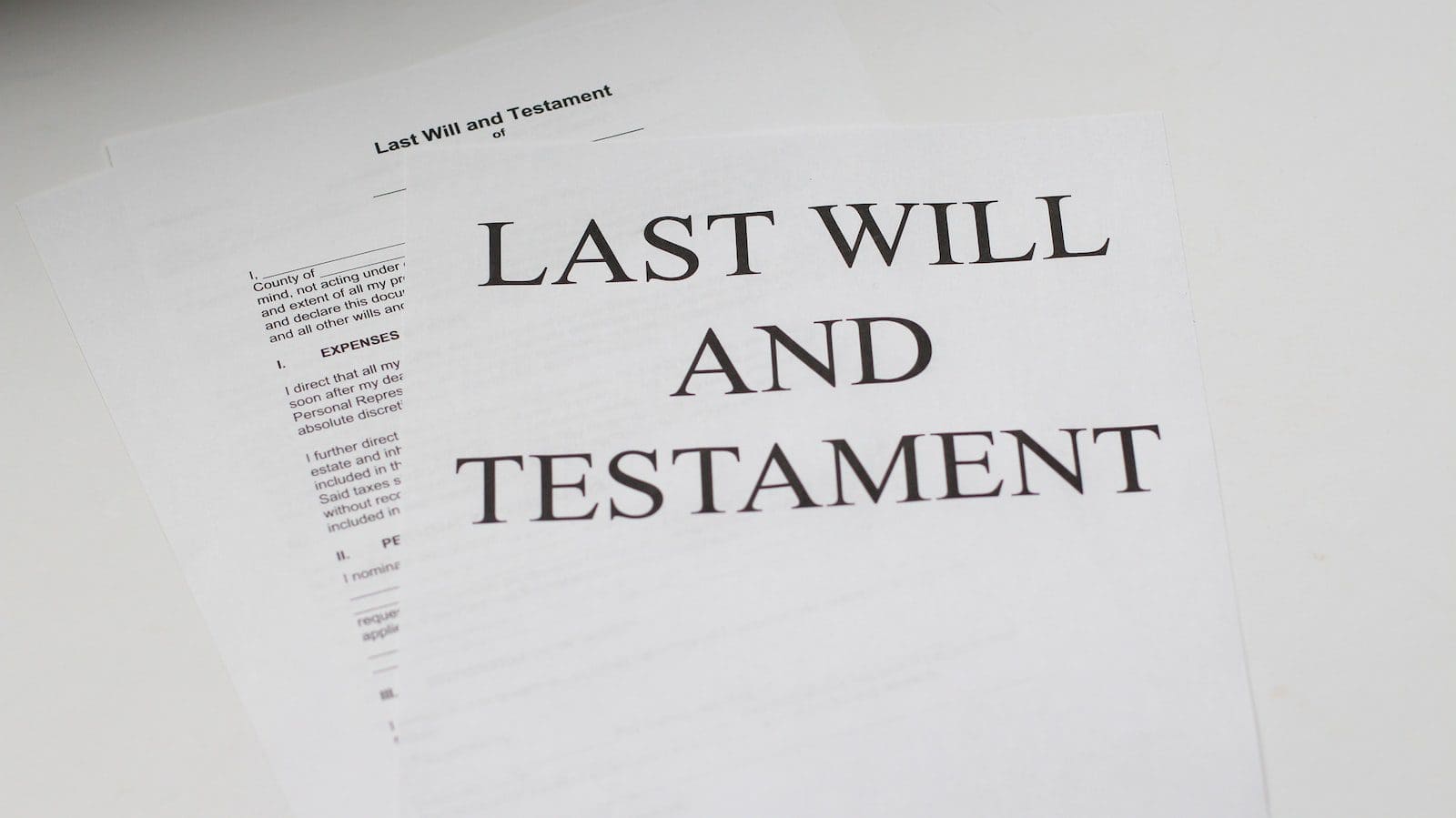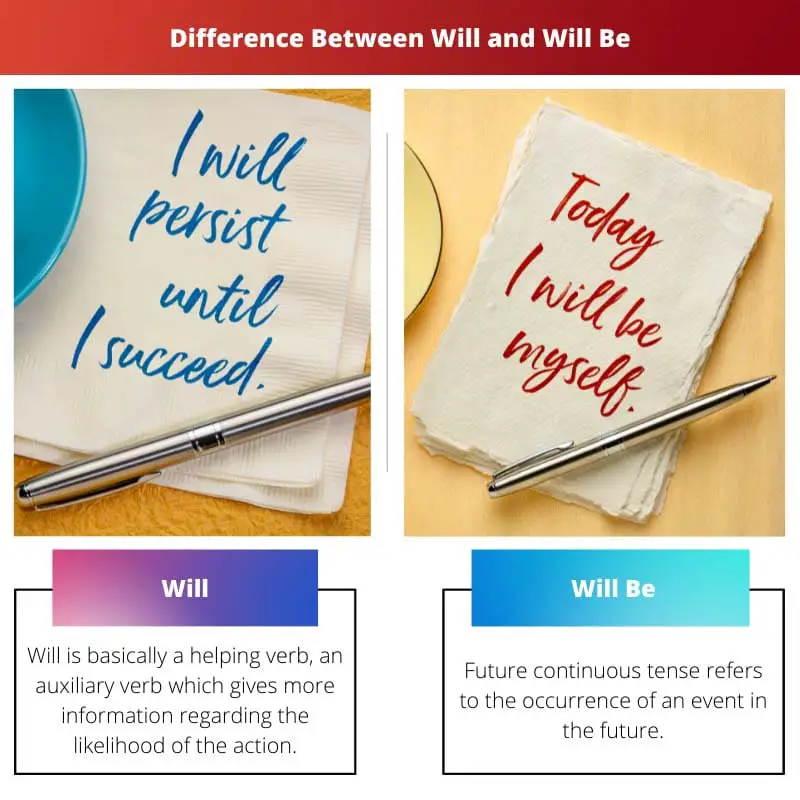Will and will be is one confusing pair of words. The addition of ‘be’ changes the meaning of the word along with the stance of the sentence.
Though it seems that he is the only change between the two, a keener look explains that these are two different words with different grammatical properties.
Key Takeaways
- “Will” is a modal verb used to indicate future actions or events, while “will be” is a future continuous tense that describes an ongoing effort in the future.
- “Will” is used to express willingness, intention, or probability, while “will be” describes an action that will progress at a specific point.
- “Will” is a more general term that can be used in various contexts, while “will be” is more specific to ongoing actions in the future.
Will vs Will Be
“Will” refers to a person’s deliberate intention or choice to do something in the future, referring to a person’s determination to carry out a particular outcome. “Will be” refers to something that is expected to happen in the future and can be used to express certainty about a future event.

The slight difference can change the outlook of the situation described by the excerpt.
Comparison Table
| Parameter of Comparison | Will | Will Be |
|---|---|---|
| Use of the word began | Afore 12th century | Afore 12th century |
| Short Form | ‘ll | I’ll be |
| Past Tense | Would | No past tense |
| Homonym | Yes | No |
| Negative sentence | Will not | Will not be |
When to Use Will?
Will is a helping verb, an auxiliary verb which gives more information regarding the likelihood of the action performed by the subject.
Will is widely used as a modal verb:
- It is used to emphasize future events, tasks, and decisions. I will make dinner for the entire clan.
- Will also points out a person’s choice in a matter-No one will believe in us.
- Will, in a sentence, also points out aggression and a staunching attitude- He will do as I tell him to do!
Questions asked and requests made using will has as the first word-Will you be able to make it on time? Will you accompany me there?
In conditions and predictions, will is used with it, making it a hypothetical statement- If preventive measures are not taken, the virus will continue to spread.
Would is the past tense of will.
The homonym of will is a noun which refers to a testimonial in which a declaration is made; on how a person wants his belongings and other valuables to be distributed after his death.

When to Use Will Be?
Future continuous tense refers to the occurrence of an event in the future; though the timespan is not confirmed, the time it will eventually take can be deduced.
The perfect depiction of this scenario is done by using the word will. I will be going for lunch tomorrow; She will be participating in the competition.
Will be can only be used for verbs denoting the performance of physical action. This is because it can only be used in cases where the movement has a defined time.
It will be used in situations which shall end within a confined time period-It will be a difficult month for the production unit.

Main Differences Between Will and Will Be
A closer look reveals that will and will be distinguished:
- Will can be placed autonomously beside a verb-I will swim- Whereas will be required for the adjacent verb to take the form of a present participle; for the sentence to be grammatical, correct-I will be swimming.
- To depict past participle while will accompanies the root of verb-she will go- for will be the verb takes the highest degree-she will be gone.

- https://dictionary.cambridge.org/dictionary/english/will
- https://dictionary.cambridge.org/grammar/british-grammar/future-continuous-i-will-be-working

This article is very informative, it certainly helped me understand the differences between will and will be.
I’m glad this could help you, the information given is very clear and easy to understand.
The article is very well written, it sheds light on the subtleties of the English language, which can be quite tricky.
I agree, it’s a subject that can be confusing, but the article explains it very well.
The article provides a very detailed comparison between ‘will’ and ‘will be’, the usage of examples makes it simpler to understand.
You’re right, the examples help a lot to clarify the differences.
The use of comparative examples makes it much easier to understand the nuanced differences between ‘will’ and ‘will be’.
Yes, the examples are illuminating and really help to differentiate the usages.
I completely agree, the examples are very clarifying and useful.
The article provides an academically rigorous analysis of the differences between ‘will’ and ‘will be’.
Indeed, the academic approach makes the article very reliable and informative.
Absolutely, the scholarly nature of the article makes it a very trustworthy source of information.
The thorough explanations are very helpful, this article is a great resource to learn about ‘will’ and ‘will be’.
Absolutely, it’s a great reference to clear up any doubts about the usage of these words.
The article provides a clear and comprehensive understanding of the nuanced differences between ‘will’ and ‘will be’.
Yes, the explanations are very thorough and effective in differentiating ‘will’ and ‘will be’.
Absolutely, the article really helps to clarify any doubts about the use of these words.
The explanation provided is very easy to understand, it makes it clearer the difference between both words.
I agree, it is a very good explanation
The article provides a very thorough analysis of the differences between the two terms.
The comparison table is very useful, it helps to visualize the differences between ‘will’ and ‘will be’.
Absolutely, it’s a great resource to clarify the contrast between the two words.
Yes, the table is very helpful to understand the different uses of ‘will’ and ‘will be’.
This article is a great resource for anyone looking to learn about the subtle differences between ‘will’ and ‘will be’.
Yes, it’s a very reliable and comprehensive source of information on the topic.
Couldn’t agree more, it really clarifies the usage of these words.